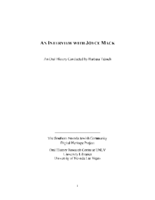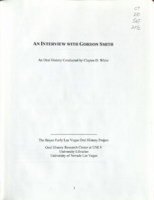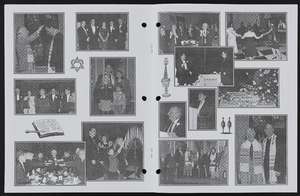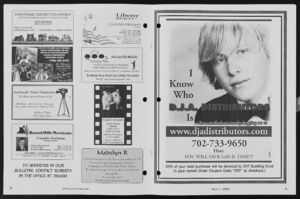Search the Special Collections and Archives Portal
Search Results

Transcript of interview with Mary Ann Culver by Stephen R. Johnson, March 22, 1981
Date
Description
On March 22, 1981, Stephen R. Johnson interviewed his friend, food and beverage cashier, Mary Ann Culver, (born on November 2nd, 1913, in Walton, Indiana) in her home in Las Vegas, Nevada. This interview covers the Union in the 1950s, entertainers, showrooms, strikes, and organized crime. During the interview Mary also discusses Elvis, shows at the Thunderbird, ownership of the Thunderbird, weather, the local bus system, traffic, and Howard Hughes.
Text

Theresa Thomas interview, March 13, 1995: transcript
Date
Archival Collection
Description
Thomas discusses her early life in Thistle, Utah before moving to Las Vegas, Nevada in approximately 1931, where her father worked on the Hoover Dam (Boulder Dam) construction. Thomas then talks about her early schooling in Boulder City, Nevada, her experiences as a swing and dance band musician, Block 16 in the Clark Las Vegas Townsite, and her memories of Las Vegas hotels and casinos. Other subjects Thomas covers include Las Vegas entertainers, entertainment venues, and women in the music industry during the 1930s.
Text

Transcript of interview with Mindy Unger-Wadkins by Barbara Tabach, October 28, 2015
Date
Archival Collection
Description
In this interview, Unger-Wadkins discusses growing up in Las Vegas? close-knit Jewish community in the 1960s and 1970s, and involvement with various Jewish youth organizations and activities. She also describes her career in public relations, reflecting upon the unique challenges faced when interacting with the public, and with politics, in her positions. Unger-Wadkins ends by describing her current work in land development, particularly the history of the Three Kids Mine and the technical and political process of ensuring the land is suitable as a residential area.
Text

Transcript of interview with Gertrude Rudiak by Claytee White, January 11, 2007
Date
Archival Collection
Description
Gertrude (n?e Rightman) Rudiak was born in 1915 in North Dakota to Russian immigrants. She grew up in Wisconsin until 1924. That was the year the family drove to California via the Yellowstone Trail, a dusty, undeveloped road marked by yellow stones. In Los Angeles, her father practiced chiropractic, a holistic approach to well-being for which there was little knowledge at the time. Gertrude earned her music degree at University of California at Berkeley; a decision that did not lead to a career. She then attended a business college and got a job as a social worker in Northern California. In 1941, she met and soon married George Rudiak. It was the advent of World War II. George enlisted in the service and was assigned to Las Vegas Gunnery School (Nellis Air Force Base.) Since he had a law degree from University of California at Berkeley and passed the Nevada Bar exam, he found supplemental employment with local attorneys. Las Vegas became the Rudiaks? permanent home where they raised their five children. In this interview Gertrude recalls the stories of coming to live in Las Vegas of the 1940?s: their phone number was 1-2-3; the neighborhood they lived in longest being Scotch 80s and being part of the secular and Jewish communities.
Text

Transcript of interview with David Straus and Heidi Straus by Barbara Tabach, November 6, 2015
Date
Archival Collection
Description
In this interview, the Straus? discuss the joys of growing up in Las Vegas during the 1960s and 1970s, and the changes within the community over time, especially in educational opportunities. Both talk about Joyce Straus? career as artist and art educator, and the influence she had on their lives. They also remember Heidi?s father, Jay Sarno, and the impact he had on the local gaming industry. There is also discussion of the founding of Congregation Ner Tamid, the role of Jewish women?s philanthropy within the community, as well as the establishment of The Meadows School.
Text

Transcript of interview with Joyce Mack by Barbara Tabach, February 23, 2015
Date
Archival Collection
Description
In this interview, Joyce Mack discusses meeting her husband, Jerry Mack, in Los Angeles,their early life as a couple, and moving to Las Vegas at the suggestion of Jerry's father, Nate Mack. She discusses how Jerry met Parry Thomas and their banking and real estate investments. Mrs. Mack talks about the opening of the Thomas and Mack Center at UNLV, and the development of the strip hotels, and discusses her children.
Joyce Mack: wife to Jerry Mack and matriarch of one of the most influential families of Las Vegas history. During this oral history conversation, she begins by tracing her family ancestry from Kiev to New York to Omaha and then Los Angeles, where she was born and raised. At a UCLA fraternity party in the early 1940s, a teenage Joyce Rosenberg was swept off her feet by her older brother's friend Jerry Mack. Jerry was from Boulder City, Nevada and had attended school in Las Vegas. In 1946, the couple married and took an extended honeymoon throughout the United States and Cuba. Soon afterwards, Jerry's father Nate Mack, a businessman and real estate developer encouraged the newlyweds to come to Las Vegas. She tells of Jerry sharing his vision of the valley's future. Thus began a successful journey that traverses decades of Las Vegas history and breathtaking growth in which the Macks were active participants and leaders. Joyce recalls the people the first met, who they raised their children side-by-side with and became lasting friends. These people were other Las Vegas pioneers including the Greenspuns and mostly importantly her husband's partnership with Parry Thomas which created the Bank of Las Vegas. It was their partnership she explains that reduced the presence of the mob element. As members of the small Jewish community of the late 1940s, the Macks would participate in the founding of Temple Beth Sholom.
Text

Transcript of interview with Gordon Smith by Claytee White, January 29, 2013
Date
Archival Collection
Description
Gordon Smith was born in Utah, but moved with his family to Babbitt, Nevada in 1947. His father, a barber, moved the family to Las Vegas in 1955. In this interview, Gordon recalls school and after-school pursuits; changes in the town; summer jobs; and college. He also talks about his military service and returning to Las Vegas to take up the razor himself - starting a successful barbering business of over 30 years.
Text



